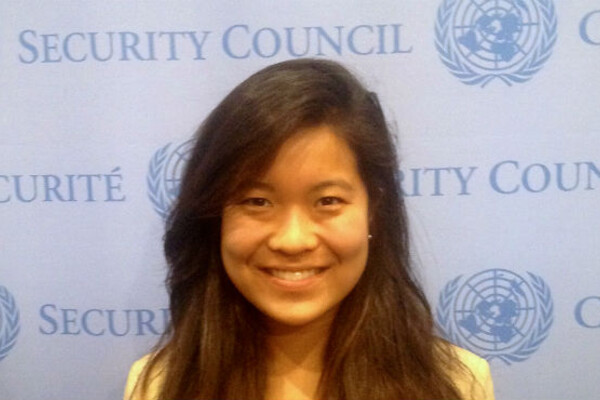5/2
Education, Business, & Law
Field Center at Penn Hosts First International Program on Child Welfare
The Field Center for Children’s Policy, Practice & Research at the University of Pennsylvania welcomed a group of students from South Korea’s Namseoul University to campus for an inaugural three-week summer program illustrating how child welfare is practiced in the United States.
Honoring Artists and a History Lesson at Penn’s Institute of Contemporary Art
It’s not graffiti, and it’s not a traditional memorial mural.
Goal of Breaking Down Barriers Leads Nancy Minyanou to Penn Abroad
Nancy Minyanou’s interest in Argentina was sparked in high school, and now this summer the rising junior at the University of Pennsylvania is fulfilling a vision for breaking down barriers and expanding her knowledge about the country in the Penn Summer Abroad program in Buenos Aires.
Penn Undergraduate Re-envisions Chicago Study of Urban Schools’ Built Environment
University of Pennsylvania student Ashlin Oglesby-Neal knows that reforming education policy and improving the internal dynamics of schools can be difficult, but that’s not stopping her from trying.
PennSound Transforms How Poetry Is Taught the World Over
PennSound, a University of Pennsylvania-based online audio poetry website, is revolutionizing the way that educators teach poetry.
Penn Plays a Major Role at a Global Forum on Education, Innovation and Democracy
Hosted within the Barbara and Edward Netter Center for Community Partnerships at the University of Pennsylvania, the International Consortium for Higher Education, Civic Responsibility and Democracy will play a major role in a global forum focused on democracy June 25-27 in Belfast, No
Valerie De Cruz: Championing Interculturalism at Penn
As director of the University of Pennsylvania’s Greenfield Intercultural Center for 17 years, Valerie De Cruz has had a guiding hand in the creation of cultural resource centers that many Penn student see as homes away from home: Makuu, La Casa Latina and the Pan-Asian American Community House.
Penn Student Learns About Intercultural Communications Through Study Abroad
For Ingred Prince, a rising junior at the University of Pennsylvania, some of her most enriching experiences have occurred through opportunities to study and explore abroad.
West Philadelphia Graduates Receive Supplemental Scholarships, Courtesy of Penn
The University of Pennsylvania’s Volunteers in Public Service Scholarship Program has awarded five $1,000 supplemental scholarships to local college-bound students who have made a difference in West Philadelphia and beyond.
Penn’s Student Body President Bridges Cultures Through Dialogue
University of Pennsylvania student Joyce Kim is on a mission to spur intercultural dialogue across campus and halfway around the world in North and South Korea.
In the News
Meet the AI expert advising the White House, JPMorgan, Google and the rest of corporate America
Ethan Mollick of the Wharton School is profiled for his knowledge and expertise in generative artificial intelligence.
FULL STORY →
U.S. Supreme Court to decide if Trump has immunity in election interference case
Kermit Roosevelt of Penn Carey Law says that the Supreme Court may try to issue a measured, unanimous decision in Donald Trump’s politically charged immunity case.
FULL STORY →
No one is above the law. Supreme Court will decide if that includes Trump while he was president
Kermit Roosevelt of Penn Carey Law says that the Supreme Court should not have taken Donald Trump’s presidential immunity case because an ideologically diverse panel of the federal appeals court in Washington adequately addressed its issues.
FULL STORY →
TikTok has promised to sue over the potential U.S. ban. What’s the legal outlook?
Justin (Gus) Hurwitz of Penn Carey Law says that the Supreme Court, given its current composition, would likely uphold a TikTok ban.
FULL STORY →
Biden signed a bill that could ban TikTok. What happens next?
Justin (Gus) Hurwitz of Penn Carey Law says that federal legislation is more likely to be seen by the courts as responding to and addressing national security concerns than similar legislation by a state.
FULL STORY →















